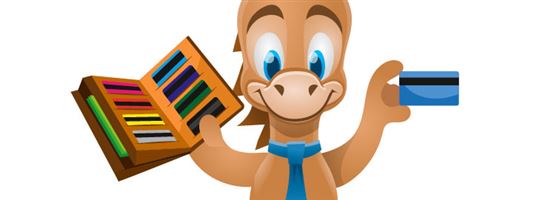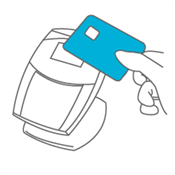How Many Credit Cards Should I Have?
It's not a bad idea to have more than one credit card. But how many is too many?
 |
| © CreditDonkey |
While there is no magic formula you can use to determine how many credit cards you should have, there are some questions you should ask yourself. You can determine the right number of credit cards to have in a few quick steps.
Keep reading to determine how many credit cards you should have.
How Many Credit Cards Do People Have on Average?
According to Experian, the average person has 3.1 credit cards. The average consumer also holds 2.5 store-brand credit cards. This includes consumers who don't have any credit cards, so the "real average" may even be slightly higher.
You shouldn't base the number of credit cards you hold on the average, though. Each person has a different number of credit cards that will be right for him or her.
Keep reading to figure out which number is right for you.
Do Too Many Credit Cards Hurt Your Credit?
This is a question with more than one answer. Can too many credit cards hurt your credit score? Sure, they can. But do they always? No, they don't. In fact, having too few credit cards can even hurt your credit score. Here's why.
If you have many "new" credit cards, they can hurt your credit score. That's because your credit "age" will be low. In order to maximize your credit score, you want an older credit age. The longer you have your credit cards (and other accounts), the length of credit history grows also. This component makes up 15% of your credit score.
Your length of credit history is an average of all accounts. Let's say you have 3 accounts you've had for 10 years, but then you opened 4 credit cards in the past year. You significantly lowered your length of credit history. This can affect your credit score.
Now, if you had seven credit cards for 10 years, your length of credit history would be nice and long. The number of credit cards wouldn't affect your score as much.
Of course, this isn't the only factor that affects your credit score, but it is one worth understanding.
How Many Credit Cards Should You Have to Have Good Credit?
Again, there's no cut and dry answer to this question. It depends on your situation. What you should focus on instead is maximizing all factors that make up your credit score. In other words:
- Keep your average credit length as long as possible: If you have several credit cards you've had for years, keep them. You can open new credit cards sporadically and keep your average credit age at a good age. Don't make the mistake of opening several credit cards in a short period of time, though. This can have a negative effect on your credit score because it can drag your credit's average age down.
- Keep your credit utilization rate down: Again, watch how much you charge. If you have more than 30% of your total credit balance outstanding, you may want to open a few more accounts. You can also request a credit line increase from your existing credit cards, which can have the same effect.
Each person will have a different number of credit cards that make their credit score "good." If you don't have credit card balances and your credit length is long, just a couple of credit cards may suffice. If you have a lot of credit card debt and a high credit utilization rate, you may need the help of more credit cards, though.
How Long Should You Wait to Apply for Another Card?
Once you apply for a credit card (and get it), your best bet is to wait six months to a year before applying for another credit card. Why wait so long?
Credit card companies and other lenders look at your inquiry history. If they notice you applied for and/or opened a credit card recently, they may consider you "high risk" if you are trying to open another credit card. Looking for large sums of money frequently could signify that you are in financial trouble. This may not be the case, but it's the inference credit card companies often make.
There are exceptions to this rule, though. If you have excellent credit, pay your credit cards in full, and have exceptionally high income, you may be able to apply for credit cards more frequently and get approved. If you have longstanding credit accounts already and your credit utilization rate is low, they may not even affect your credit score much.
In general, though, sticking to the 6- to 12-month rule usually yields the best results.
Is It Bad to Have Unused Credit Cards
You might think canceling unused credit cards is a smart choice. It limits your ability to rack up credit card debt, right?
While that's true, canceling a credit card may do you more harm than good. It all goes back to your credit age and your utilization rate again.
Ask yourself the following questions:
- How old is the credit card? Did you just get the card recently? Maybe you applied for it for the introductory bonus or discount you received. Now you decided you don't want it. Canceling it probably won't hurt your credit score. On the other hand, if you cancel a credit card you've had for many years, it could lower your average credit history's age, which can hurt your credit score.
- Do you have a lot of outstanding credit card debt? Even though your credit card sits unused, it's helping your credit utilization rate. The fact that you aren't using the card means your available balance is equal to your total available credit. If you have other credit cards with balances, the unused credit card may offset your spending and keep your credit utilization rate in check. Closing an old credit card could lower your available credit and increase your utilization rate. This could mean that it damages your credit score.
Before you close it, though, make sure you don't have a balance and that you've redeemed any rewards. Once you close the account, you lose any outstanding rewards. That could be like throwing free money out the window!
Can I Have Two Credit Cards from the Same Company?
Technically, you can have as many credit cards from the same company as they will approve you to have. Should you have more than one credit card from the same company, though? It depends on the factors. You should consider the following:
- Why are you thinking of opening account? If you want to transfer a balance, you probably won't be able to transfer a balance from your card with the same company. If you want to open it for other benefits that don't take into consideration your other balances, it may be just fine.
- Your status of either account could affect the other credit card. If you make a mistake (we all do it) and miss a payment or go over your credit limit on one credit card, it may affect your other account with the company. Even if you stayed on time with your payments and never went over the limit on the other credit card, it's often a domino effect when you have more than one account with a credit card company.
Bottom Line
So how many credit cards should you have? As you can see, it really depends on your situation. We recommend closely evaluating your financial situation before taking another credit card. Determine why you want the card, what you will get out of it, and how it will affect your credit score.
Write to Kim P at feedback@creditdonkey.com. Follow us on Twitter and Facebook for our latest posts.
Read Next:






